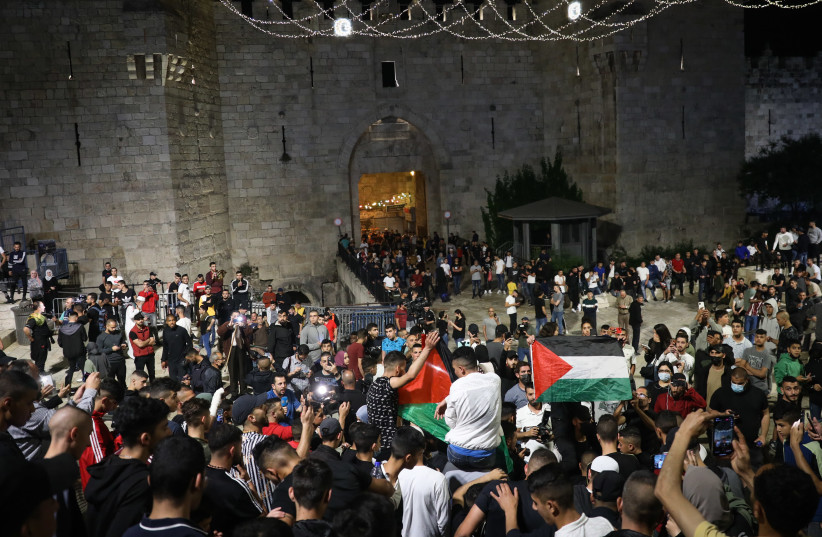The clashes that erupted between Palestinians and Israeli police officers outside the Old City of Jerusalem over the past two days are a clear indication that the Palestinian Authority and Jordan either have no real influence over events in the city or that they did not do anything to calm the situation.
The PA, which has no security presence within the municipal boundaries of Jerusalem, is reported to have assured Israeli, American and Jordanian officials that Ramallah is interested in calming the situation and preventing an outbreak of violence during Ramadan.
The assurances were relayed during meetings with Israeli and US officials, as well as the Jordanian authorities, including King Abdullah II, who even paid a rare visit to Ramallah as part of an effort to avert a flare-up of violence and tensions during Ramadan, which began on Saturday.
Palestinian and Jordanian officials, who talked about the need to prevent a “major escalation” in the city, urged Israel to ease tensions by preventing Jews from touring the Aqsa Mosque compound on the Temple Mount during Ramadan and Passover.
The Palestinians and Jordanians also advised Israel to avoid enforcing tough security measures and restrictions during Ramadan, especially in and around the Old City of Jerusalem.

During last year’s Ramadan, violent clashes erupted in protest of the installation of security barriers at Damascus Gate to prevent large numbers of Palestinians from gathering there in the late evening, after the fast-breaking iftar meal.
This year, the Israeli authorities did not set up the barriers, apparently in response to promises that the PA and Jordan would, in return, work to calm the situation and prevent violence.
Despite the Israeli easing of restrictions and the promises by Ramallah and Amman, dozens of Palestinians have over the past two days attacked police officers with rocks, fireworks, iron bars and empty bottles.
Clearly, neither the PA nor Jordan are capable of playing any role in preventing violence in Jerusalem.
The PA leadership, despised by many residents of east Jerusalem, has actually ramped up its campaign of incitement against Israel.
In the past year, worshipers attending Friday prayers at the Aqsa Mosque compound have chanted slogans in support of Hamas. Other worshipers are known to be affiliated with Hizb ut-Tahrir, a pan-Islamist extremist organization that aims to reestablish the Islamic caliphate.
During other protests in east Jerusalem, Palestinians have often condemned the PA for being “in collusion” with Israel and depriving the Palestinians of foreign aid.
Even many east Jerusalem activists affiliated with the ruling Fatah faction headed by PA President Mahmoud Abbas are known to not obey orders from Ramallah.
The Jordanians, for their part, have essentially no influence over what’s happening in Jerusalem, although they continue to control the Wakf Islamic religious trust, which is responsible for administering the affairs of the Islamic holy sites, including the Aqsa Mosque compound.
In 1988, Jordan renounced its claims to the West Bank, with the exception of guardianship over the Muslim and Christian holy sites in Jerusalem. The decision significantly reduced the kingdom’s influence over the Palestinians, including those in east Jerusalem.
A few years later, the “divorce” between Jordan and the Palestinians was reinforced with the signing of the Oslo Accords between Israel and the PLO.
Despite the fears of an outbreak of violence ahead of Ramadan, the PA and Jordan did not issue a public appeal to the Palestinians to maintain calm and order in Jerusalem. Yet, even if they had issued such an appeal, it would have fallen on deaf ears.
Instead of making good on their promises to work toward calming the situation, the PA and Jordan continue to issue strong condemnations of Israel almost on a daily basis. Now, they are blaming Israel for the violence.
In Ramallah, PA officials claimed that Israel and “settlers” were preparing to commit “crimes” and “massacres” against the Palestinians and al-Aqsa Mosque.
In Amman, the Jordanian government on Monday condemned Israel over “provocative raids into the Aqsa Mosque compound by hard-line Jews under the protection of Israeli police.”
